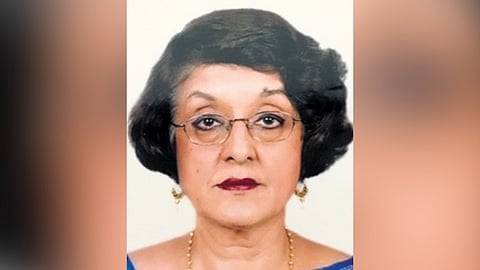

BENGALURU: Bangladesh is caught in a political turmoil following the students’ protests that resulted in the ouster of former prime minister Sheikh Hasina. There is likely to be a caretaker government headed by Nobel Laureate Muhammed Yunus. While there are speculations on the future of India-Bangladesh relationship, former Indian ambassador to Bangladesh, Veena Sikri, said these are “difficult times for the country but India-Bangladesh ties will endure.”
Speaking about the historic India-Bangladesh relationship, she countered comments made by Muhammed Yunus on India’s “flawed” foreign policy towards Bangladesh and said, “India has always been a very close friend of Bangladesh and will continue to work towards enhancing mutual ties and people to people relationships. India has always dealt with every elected government with the same sincerity of purpose.”
“It is wrong to say that India should have intervened during the deadly students’ clashes. We maintained that this was their internal matter and we stood by our policy. How could India intervene and on what grounds? The protests started in June on a peaceful note and students were on the same page as the government. If we had interfered then there would have been anti-India riots in Bangladesh,” added Sikri.
On the allegation that India congratulated Hasina on her re-election in a “flawed” election, Sikri said that a number of foreign observers, including from India, were sent during Bangladesh elections and none of them found any fault with the process. “The Bangladesh Nationalist Party (BNP) had withdrawn from the polls and the Jamaat-i-Islami was barred by the high court from contesting the elections,” she said.
The diplomat said it would amount to selective amnesia if people forget that Hasina had abolished the quota system for six years between 2018 and 2024. On an appeal, the HC had restored it and Hasina appealed against it before the Supreme Court. “A section of the students’ groups went along with her. What unfolded in the last few days of the clashes, which led to her ouster, was more than a students’ protest,” she said.
“The visuals of protestors bringing down the statue of their founding father Sheikh Mujibur Rehman, torching Dhaka House and vandalising the Indian Cultural Centre in Dhaka do not seem to be the work of students. It speaks of the involvement of vested interests, even the students’ wings of some political parties,” said Sikri.
Sikri did not rule out the role of China and Pakistan in the escalation of the clashes in Bangladesh and said that India should closely watch the developments and be on the “top of things and safeguard our people and interests in Bangladesh. We must constantly engage with the military and civilian authorities to ensure the safety of Indians and our religious and cultural places, and to continue the development of the bilateral relationship,” she added.